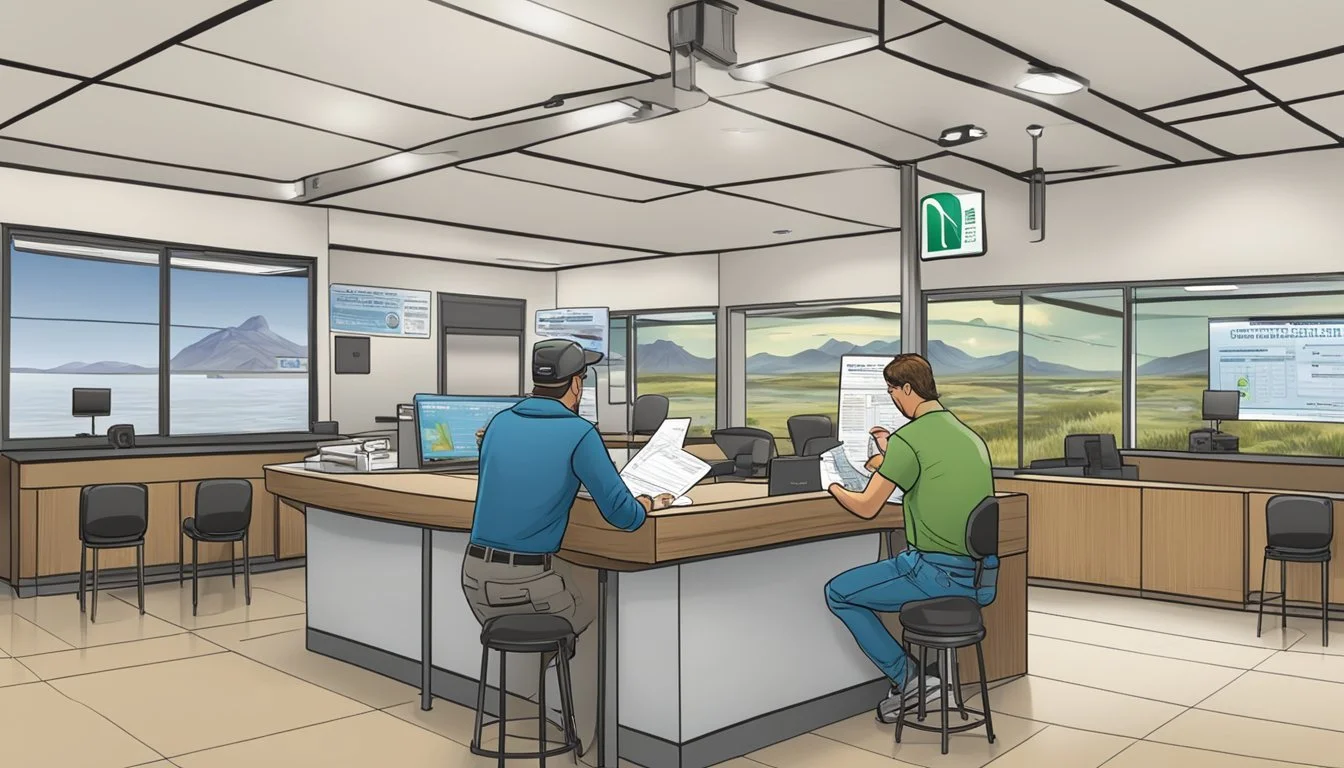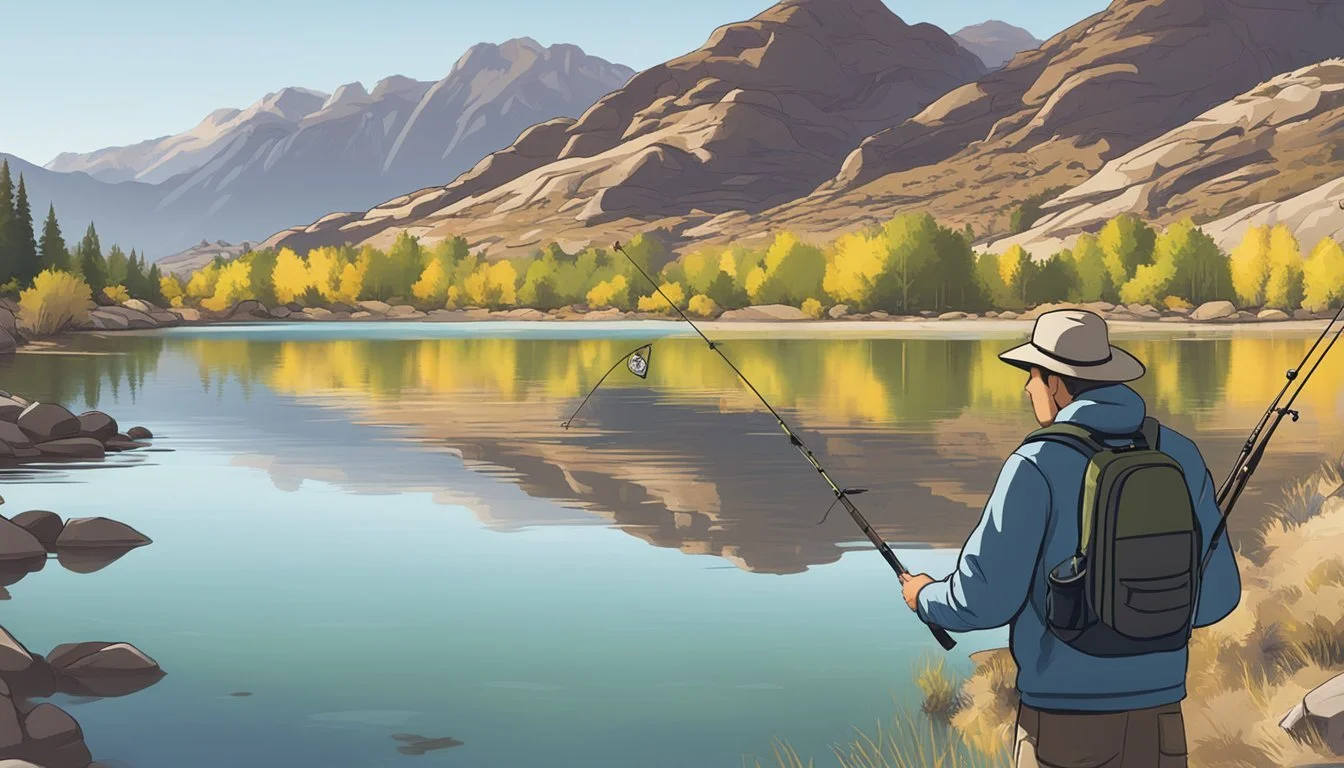How to Get a Nevada Freshwater Fishing License
Your Step-by-Step Guide
Securing a Nevada freshwater fishing license is an essential step for anyone looking to fish (What wine goes well with fish?) in the state's diverse aquatic landscapes, ranging from desert reservoirs to alpine lakes. The process is straightforward and accessible to both residents and non-residents. Anglers aged 12 years and older are required to have a valid license, and obtaining one ensures the preservation and conservation of Nevada’s natural fish habitats, making it a responsible and necessary part of the fishing experience.
The Nevada Department of Wildlife (NDOW) offers various options to purchase a fishing license, such as annual and short-term passes, catering to the needs of occasional visitors and avid fishermen alike. Licenses are available for purchase through NDOW's secure online system, by phone, or at authorized licensing agents throughout the state. This system not only simplifies the acquisition but also contributes to wildlife management efforts.
By abiding by the regulations set forth by NDOW regarding licensure, anglers contribute to the sustainable use of the state's freshwater ecosystems. Licensed fishing in Nevada is not only a legal requirement but also a commitment to supporting the state's environmental stewardship initiatives.
Understanding Nevada Fishing Licenses
Getting the appropriate Nevada fishing license is essential for both residents and non-residents who want to engage in freshwater fishing legally. This license ensures that fishing activities are regulated for the preservation of wildlife and support of natural resources.
Basics of a Fishing License
In Nevada, anyone who fishes in public waters must possess a valid fishing license. There are provisions for annual licenses as well as 1-day fishing permits for those looking for a short-term option. Residents are typically eligible for reduced license fees compared to non-residents. Youth under the age of 12 are exempt from licensing, but there are youth fishing licenses available for older children and teenagers at a reduced cost.
Types of Nevada Fishing Licenses
Nevada offers a variety of licenses to cater to the different needs of anglers:
Annual licenses for residents and non-residents
A 1-day fishing permit, which can be extended at an additional daily rate
Youth fishing licenses for those aged 12–17
Senior licenses for residents aged 65 and older with 5 years of continuous residency
Interstate Boundary Water licenses, for waters bordering other states
Special Fishing Permits and Combination Licenses
Certain bodies of water or fishing activities may require a special fishing permit in addition to a standard license. For anglers who also hunt, combination licenses that include both fishing and hunting privileges are available. These combination licenses come in forms such as a senior specialty combination license for qualifying senior residents, and a youth combination license for younger anglers and hunters. Combination licenses particularly benefit those who participate in multiple outdoor activities, offering convenience and oftentimes financial savings.
Eligibility and Requirements
To purchase a Nevada freshwater fishing license, an individual must meet specific residency, age, and military service criteria. Licenses are obtainable through license agents or directly via the Nevada Department of Wildlife (NDOW) offices.
Residency Criteria
Residents are defined as individuals who have established a bona fide domicile within the State of Nevada for a set period prior to the purchase of a fishing license. This involves maintaining a permanent residence and the intention to return when absent. Being enrolled as a student at an institution of higher learning in Nevada or maintaining temporary absences does not affect one's resident status.
Active Duty and Veterans
Active members of the Armed Forces, their spouses, and dependents qualify for resident fishing licenses. Eligibility extends to those stationed in Nevada and those who are residents of Nevada but stationed elsewhere. Proof, such as leave papers, may be required. Veterans with a service-connected disability as defined in the NRS 502.280 are eligible for a discounted license and must provide a letter of eligibility.
Senior and Youth License Options
Discounted licenses are available for seniors who are 65 years of age or older and youth between the ages of 12-17. The senior fishing license requires proof of age, while the youth fishing license is designed to encourage younger individuals to experience fishing in Nevada's freshwater bodies. Resident status is necessary for these specific age-related licenses.
How to Purchase a Fishing License
Purchasing a fishing license in Nevada is a straightforward process administered by the Nevada Department of Wildlife (NDOW). Anglers have multiple options for obtaining the necessary permits to fish in the state's freshwater bodies.
Online Purchase Method
Individuals looking to buy a fishing license can do so conveniently online through the NDOW licensing website. Here are the steps they should follow:
Visit the official NDOW licensing portal.
Create an account or log in if they already have one.
Select the type of fishing license they need.
Complete the transaction with a valid payment method.
In-Person Purchase Locations
While purchasing online is quick and easy, some anglers prefer the in-person experience. They can visit:
Authorized license agents, which can be found throughout Nevada.
NDOW offices, where they can receive assistance and buy their license directly.
License Requirements for Different Age Groups
Fishing license requirements in Nevada vary based on the angler's age. Here's a brief outline:
Age Group Requirement Under 12 No license required 12-17 Youth fishing license 18-64 Regular adult fishing license 65 and over Senior fishing license (discounted rates may apply) Disabled Anglers May be eligible for special permits and rates
For complete details and requirements, they should refer to the NDOW regulations.
Regulation and Compliance
The acquisition and use of a Nevada freshwater fishing license is strictly governed by state regulations to ensure conservation and proper management of aquatic resources. Adhering to these regulations is critical for both the sustainability of fish populations and the legal compliance of anglers.
Understanding State Fishing Regulations
In Nevada, anglers must be aware of the detailed fishing regulations that govern the state's waters. These regulations are designed to maintain fish populations and promote conservation. They specify the seasons during which anglers can fish to protect certain species during their spawning periods. For instance, regulations delineate which fish are considered game fish, and when it is lawful to fish for them, often providing specific dates that mark the start and end of fishing seasons.
Interstate Boundary Water Licenses
For waters that straddle state boundaries, anglers should understand the regulations that apply to interstate boundary waters. A Nevada fishing license permits fishing across certain interstate waters, but anglers must also comply with the neighboring state's regulations when fishing these boundary waters. They must ensure they have the appropriate licensure, especially when fishing on waters shared with neighboring states, and follow the possession and bag limits set forth by both jurisdictions.
Possession and Bag Limits
The possession limit is a critical aspect of fishing regulations aimed at conservation and preventing overfishing. This limit refers to the total number of specific fish species that one person can legally keep at any given time, including those stored at home. The limits may vary by species and are strictly enforced to ensure the health of fish populations. Additionally, bag limits, which refer to the maximum number of fish an angler may take in a single day, are also enforced to regulate daily catches and support sustainable fishing practices.
Nevada Fishing Resources
Nevada offers a variety of fishing resources to educate and facilitate anglers at all experience levels. From information about specific fishing locations to fish species and ongoing conservation efforts, these resources are designed to help enhance the fishing experience in Nevada.
Fishing Locations and Accessible Waters
Nevada boasts an array of freshwater fishing locations, including well-known lakes such as Lake Mead, Lake Tahoe, and Lake Mohave, as well as smaller waters like Topaz Lake, various ponds, rivers, and reservoirs. These waters are accessible for both boat and shore fishing, ensuring that anglers can find a spot that suits their preferred method of fishing.
Popular Nevada Fishing Lakes and Reservoirs:
Lake Mead
Lake Tahoe
Lake Mohave
Topaz Lake
Fish Species and Habitats
Anglers can encounter a diverse range of fish species in Nevada's waters. Native species, such as the cutthroat trout, thrive in these habitats, alongside introduced species like rainbow trout, largemouth bass, striped bass, catfish, perch, and bluegill. Each body of water may house a different combination of species, providing a unique fishing experience at each location.
Common Fish Species in Nevada:
Trout: Cutthroat, Rainbow
Bass: Largemouth, Striped
Others: Catfish, Perch, Bluegill
Conservation and Environmental Programs
Nevada's fishery management is deeply involved in habitat development and the preservation of aquatic ecosystems. Endangered species programs work to protect vulnerable fish populations, while conservation education aims to inform the public on sustainable fishing practices. These programs are crucial for maintaining the health of Nevada's waters and ensuring a positive future for the state's diverse fish species.
Key Conservation Efforts:
Habitat development initiatives
Endangered species protection programs
Conservation education for the public
Additional Fishing Opportunities and Considerations
Nevada offers a diverse range of fishing experiences, from its numerous lakes and rivers to various events and combined outdoor activities. Anglers in Nevada can not only enjoy the sport but also engage in competitions, recreational fishing gatherings, and dual hunting and fishing expeditions, all while adhering to conservation practices.
Fishing Events and Competitions for Anglers
Nevada plays host to various fishing competitions which are great for those looking to test their skills against other anglers. These events may require additional permits or fees beyond the standard Nevada fishing license. Participants must ensure their gear complies with event regulations, and they often contribute to local conservation efforts through their participation.
Fishing as a Recreational Activity
Fishing is a popular recreational activity in Nevada, where anglers find solace on the banks of bodies of water like Lake Mohave or the clear streams of the state. Non-profits and local communities frequently organize events promoting fishing as a leisure activity that encourages conservation and education about the local aquatic ecosystems.
Combining Fishing with Hunting Activities
For those interested in a comprehensive outdoor experience, Nevada permits the combination of fishing with hunting activities. Individuals with an active duty status may find specific licensing considerations. It’s important for participants to have the correct licenses and to follow the state's regulations to ensure both fishing and hunting activities comply with conservation and legal standards.
Special Considerations
When seeking a Nevada freshwater fishing license, anglers should consider unique ecosystem requirements, urban fishing regulations, and rules pertaining to wildlife refuges and protected fisheries. Each category has particular regulations to ensure sustainable fishing practices and the protection of Nevada's diverse aquatic habitats.
Fishing in Unique Nevada Ecosystems
Nevada's diverse ecosystems offer a variety of fishing experiences, from the deep, cold waters of Lake Tahoe, where mackinaw thrive, to the clear streams of the East Walker River, known for its trout populations. Anglers should be aware that ecosystems like Pyramid Lake have special regulations due to the presence of the Lahontan cutthroat trout, a native species that requires specific conservation efforts. When fishing in these areas, it's important to check for any additional permits required beyond the state fishing license.
Pyramid Lake: Requires separate tribal permits as it is within the Pyramid Lake Paiute Tribe's reservation.
East Walker River: Follow state regulations and be mindful of seasonal variations in fish populations.
Urban Fishing in Las Vegas
Las Vegas offers several urban fishing spots that are convenient for residents and visitors. However, these areas might have different stocking schedules and fish species targeted for urban environments, typically channel catfish and rainbow trout. Fishing in urban ponds and lakes of Las Vegas requires the same state license as elsewhere in Nevada.
Sunset Park Pond: Stocked with trout in the winter and catfish in the summer.
Lorenzi Park Pond: Accessible fishing for various urban fish species within the city limits.
Wildlife Refuges and Protected Fisheries
Fisheries within National Wildlife Refuges like the Ruby Lake National Wildlife Refuge near Elko offer unique fishing experiences with a focus on conservation. Regulations are stricter, designed to protect vulnerable species and habitats. Special rules apply for fishing in these areas and are often strictly enforced to maintain the ecological balance.
Ruby Lake National Wildlife Refuge: Specializes in habitat for waterfowl and other wildlife species, with limited fishing access to protect the environment.
Shoreline Fishing: Often permitted, but anglers should ensure they respect any posted restrictions to avoid disturbing the habitat.








